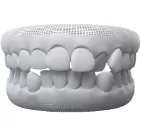A bright, healthy smile not only boosts your confidence but also plays a vital role in your overall oral health. However, if you have a damaged, decayed, or weakened tooth, you may not feel as comfortable showing off your smile. Fortunately, dental crowns offer a reliable and effective solution to restore the function, appearance, and strength of your teeth. Dental crowns are one of the most common restorative procedures in dentistry, and they can transform your smile in a matter of just a few appointments.
In this comprehensive guide, we will delve into everything you need to know about dental crowns, including how they work, the different types of crowns available, the procedure for getting one, and the benefits they offer.
What Are Dental Crowns?
A dental crown is essentially a cap or cover that is placed over a damaged or weakened tooth. Its primary purpose is to restore the tooth’s shape, size, strength, and appearance. Crowns are custom-made to fit each patient’s tooth precisely, ensuring a natural look and feel once the procedure is complete.
Crowns are often used when a filling or other types of restorative treatments aren’t sufficient to fix the problem. For example, if a tooth has been extensively damaged due to decay or trauma, a crown can reinforce the tooth, providing it with the necessary strength to function normally.
Why Would You Need a Dental Crown?
There are several reasons why your dentist might recommend a dental crown, including:
- To Protect a Weak Tooth: If a tooth has been weakened by decay or trauma, a crown can prevent it from breaking or cracking.
- To Restore a Broken Tooth: Crowns are used to rebuild teeth that have already been broken or worn down, providing structure and strength.
- To Cover a Large Filling: Sometimes, after a large filling, the remaining tooth structure may not be enough to support normal chewing forces. A crown can cover the filling and protect the tooth.
- To Cover a Dental Implant: Crowns are often used in conjunction with dental implants to replace missing teeth.
- For Cosmetic Reasons: Crowns can also be used to cover misshapen or severely discoloured teeth, improving the overall appearance of your smile.
Types of Dental Crowns
There are different types of crowns available, each with its own set of advantages. The type of crown that is right for you will depend on the location of the tooth, the amount of damage, and your personal preferences. Here are the most common types of dental crowns:

1. Porcelain Crowns
Porcelain crowns are popular due to their natural appearance. They closely resemble natural tooth enamel and can be matched to the colour of your surrounding teeth. Porcelain crowns are a great option for front teeth or teeth that are highly visible when you smile.
However, porcelain crowns may not be as strong as other types of crowns, which is why they are not always recommended for molars or areas that experience heavy biting forces.
2. Ceramic Crowns
Ceramic crowns are similar to porcelain crowns in terms of appearance, but they offer enhanced durability. They are also an excellent choice for individuals who have metal allergies. Ceramic crowns are most often used for front teeth due to their ability to blend seamlessly with the natural tooth color.
3. Metal Crowns
Metal crowns are made from a combination of metals, including gold, platinum, or base-metal alloys like nickel or chromium. Metal crowns are incredibly durable and can withstand significant pressure from chewing and grinding. Although they do not look like natural teeth, metal crowns are ideal for molars located in the back of the mouth where strength is more important than appearance.
4. Porcelain-Fused-to-Metal Crowns (PFM)
Porcelain-fused-to-metal crowns combine the strength of metal with the appearance of porcelain. The metal provides durability, while the porcelain gives the crown a tooth-colored appearance. PFM crowns are a popular option for both front and back teeth, offering a good balance between aesthetics and strength.
5. Zirconia Crowns
Zirconia crowns are known for their strength and aesthetic appeal. Zirconia is a type of ceramic that is stronger than porcelain and can withstand a lot of pressure. It also has a natural tooth-like appearance, making it an excellent choice for both front and back teeth.
The Dental Crown Procedure: What to Expect
Getting a dental crown typically requires two visits to the dentist. Here’s what you can expect during each step of the procedure:
1. First Visit: Tooth Preparation
During the first visit, your dentist will examine the tooth that will receive the crown to ensure that it is healthy enough to support the restoration. If the tooth has decay or damage, the dentist will remove the damaged portion and shape the tooth to accommodate the crown.
After the tooth is prepared, an impression or digital scan of your tooth will be taken. This impression is sent to a dental lab where the custom crown is created to fit your tooth perfectly. In the meantime, your dentist will place a temporary crown to protect the tooth until the permanent crown is ready.
2. Second Visit: Crown Placement
Once your permanent crown is ready (usually after a couple of weeks), you’ll return to the dentist’s office for the final placement. The temporary crown will be removed, and your dentist will check the fit and color of the new crown before cementing it into place.
The dentist will make any necessary adjustments to ensure that the crown fits comfortably and looks natural. Once the crown is in place, it will function just like a natural tooth, allowing you to chew, speak, and smile with confidence.
Benefits of Dental Crowns
Dental crowns offer a wide range of benefits, making them a popular choice for restorative and cosmetic dental treatments. Some of the key benefits include:

1. Restored Functionality
One of the primary benefits of dental crowns is that they restore the normal function of a damaged tooth. Whether it’s a tooth that has been weakened by decay or a tooth that has been broken, a crown can restore its ability to chew and function properly.
2. Improved Aesthetics
Dental crowns can dramatically improve the appearance of your teeth. Whether you need to cover a discoloured tooth or correct the shape of a misshapen one, crowns provide a natural-looking solution that enhances your smile.
3. Durability
Crowns are designed to last for many years, especially if they are made from strong materials like metal or zirconia. With proper care, crowns can last anywhere from 10 to 20 years or even longer.
4. Protection for Vulnerable Teeth
Crowns provide an additional layer of protection for teeth that are vulnerable to further damage. Whether it’s a tooth that has undergone a root canal or one that has been damaged by trauma, a crown shields the tooth and prevents it from breaking or deteriorating.
5. Custom Fit
Because dental crowns are custom-made, they are designed to fit your tooth perfectly. This ensures a comfortable, snug fit that allows the crown to function just like a natural tooth.
How to Care for Your Dental Crown
While dental crowns are durable, it’s essential to take care of them to ensure their longevity. Here are some tips for caring for your dental crown:
- Maintain Good Oral Hygiene: Brushing twice a day and flossing daily is essential for keeping your crown and the surrounding teeth clean and healthy.
- Avoid Chewing Hard Foods: While crowns are strong, they can still be damaged by excessive pressure from hard foods like ice, hard candy, or nuts.
- Regular Dental Checkups: Visit your dentist regularly for checkups and cleanings. Your dentist will monitor the condition of your crown and ensure it is functioning properly.
- Wear a Mouthguard: If you grind your teeth at night, your dentist may recommend wearing a mouthguard to protect your crown and prevent damage from clenching or grinding.

The Cost of Dental Crowns
The cost of a dental crown varies depending on the type of material used, the location of the tooth, and the dentist’s fees. On average, dental crowns can range from AED 2,000 to AED 3,000 in Dubai, depending on the clinic and the complexity of the procedure. Some dental insurance plans may cover a portion of the cost, so it’s worth checking with your provider.
Dental crowns are a versatile and effective solution for restoring damaged or weakened teeth. Whether you need to protect a tooth after a root canal, cover a large filling, or improve the appearance of a discoloured tooth, crowns offer a long-lasting and aesthetically pleasing option.
At Mint Dentals Care in Dubai, our experienced team of dentists specialises in providing high-quality dental crowns that restore both the function and appearance of your teeth. If you’re considering a dental crown, contact us today to schedule a consultation and take the first step toward restoring your smile!















